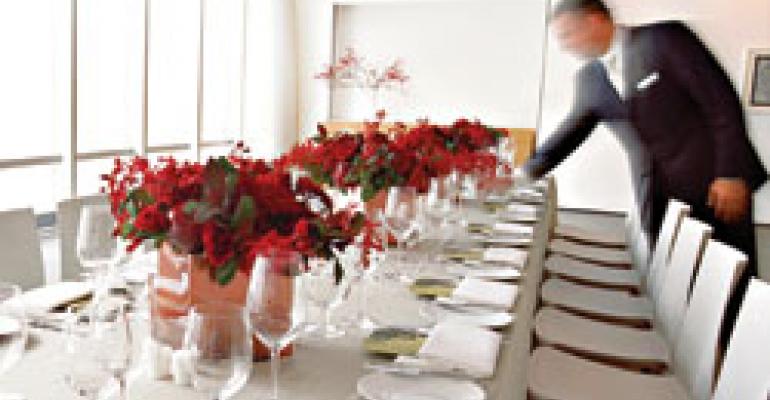As the recession continues to hamper spending on private-dining events, fine-dining operators are taking a cue from their quick-service brethren and highlighting the value of their offerings.
From discounted prices to revamped menus and loyalty programs, operators are rethinking private dining to rebuild sales that have taken a beating as businesses and consumers rein in spending on parties.
According to the National Restaurant Association’s 2008 Restaurant Industry Operations Report, parties and banquets at full-service restaurants with average checks of $25 and up account for between 10 percent and 15 percent of total sales—a sizable chunk of change to lose.
“There’s no doubt with this being the toughest market in decades…there’s substantially more wheeling and dealing going on in private dining,” said Hudson Riehle, the NRA’s senior vice president of research.
Among the many operators trying to lure private diners with price discounts is Patina Restaurant Group, a multifaceted foodservice company with numerous restaurants on both coasts. In New York, the company is trying to entice private diners by offering budget-priced menus at several of its concepts, including Cafe Centro, a Parisian style brasserie in Midtown, and Naples 45, an upscale pizzeria, also in Midtown.
“These are uncharted waters, and we are reinventing each day how we sell and approach clients,” said Sharon Colabello, director of catering at Patina. “We are hoping that our sensitive budget-priced menus will enable our clients to still host their events and allow the restaurants to maintain their catering budgets.”
Also dropping prices for private events is Grant’s, a market fresh American concept in West Hartford, Conn. To lure parties to its private-dining table, the 120-seat restaurant has reduced its threecourse market meals from $45 and up to just $30. Grant’s also is offering $100 restaurant gift certificates with each private party booking.
“It’s definitely helped…it’s driving traffic,” chef and owner Billy Grant said of the deals.
Even New York’s famed “21” Club, which has been catering to high-society folk, politicians and show business types since the late 1920s, is using price cuts to attract private diners.
“The economy has most likely caused restaurants with private dining rooms in New York City to do business differently,” said the “21” Club’s general manager, Bryan McGuire. “When good attendance and budget accommodation are critical, most companies will seek out venues like ours who are willing to go the extra mile to ensure success.”
To keep its 10 private dining rooms filled despite the recession, the “21” Club reduced the cost of its three-course wine cellar dinners and lunches by 20 percent, launched its first-ever fixed-price menu and increased commissions for planners that book events.
Price cuts aren’t the only solution operators are trying to get the private party re-started. Some operators are finding success by including value-added freebies, launching loyalty programs or being more flexible with their offerings.
Corporate private-dining business was down significantly from November to March at Brix Restaurant in California’s Napa Valley, but officials say sales have increased in recent months thanks to value-added extras.
“When working with groups on a tight budget, instead of reducing prices [we] try to add value,” said Matt Guyot, Brix private events manager. “[We] throw in a complimentary glass of champagne, an amuse, a truffle at the end of the meal, 10 percent off in the wine retail shop.”
Private dining is a significant portion of business for Newport Restaurant Group, which has private and semi-private rooms at all seven of its restaurants. When the economy began to slide and corporate bookings started to decline, the Newport, R.I.-based company rolled out Entourage, a rewards program for its top event-planning professionals. Members of the program earn points for every event they plan with NRG. The points can be used to offset the cost of future events or for personal use at any of the company’s properties.
“To us, repeat customers, especially in an economy like this, are so important,” said Kerri Quinn Jaffe, NRG’s director of hospitality sales, in explaining why the program was launched. “This is a way to add value…to reward loyalty.”
While the company hasn’t measured the success of the program yet, Jaffe says that anecdotally it’s been very well received and has “really taken off” in the last six months.
Flexibility is the key to private-dining success for New York City-based Union Square Hospitality Group, owner and operator of such high-end restaurants as Union Square Cafe, Gramercy Tavern, Eleven Madison Park and The Modern, which is located in the Museum of Modern Art.
“The most important tactics are flexibility and responsiveness…we’re working with people,” said Paul Bolles-Beaven, president of the Core Restaurant Group at USHG. “In these times you have to be more creative. The thing that doesn’t cost any money is how people are treated.”
Diners are appreciating the effort, Bolles-Beaven said, noting that the company’s private-dining bookings have increased dramatically in the last month, returning to the levels of early 2008.
“This is our fourth recession,” he said. “…While each recession is unique, some things remain the same: People are looking for value and want to be taken care of, and more than ever they need to feel hope. If we can athletically provide those things to all our stakeholders, we will come through this time stronger than ever.”




